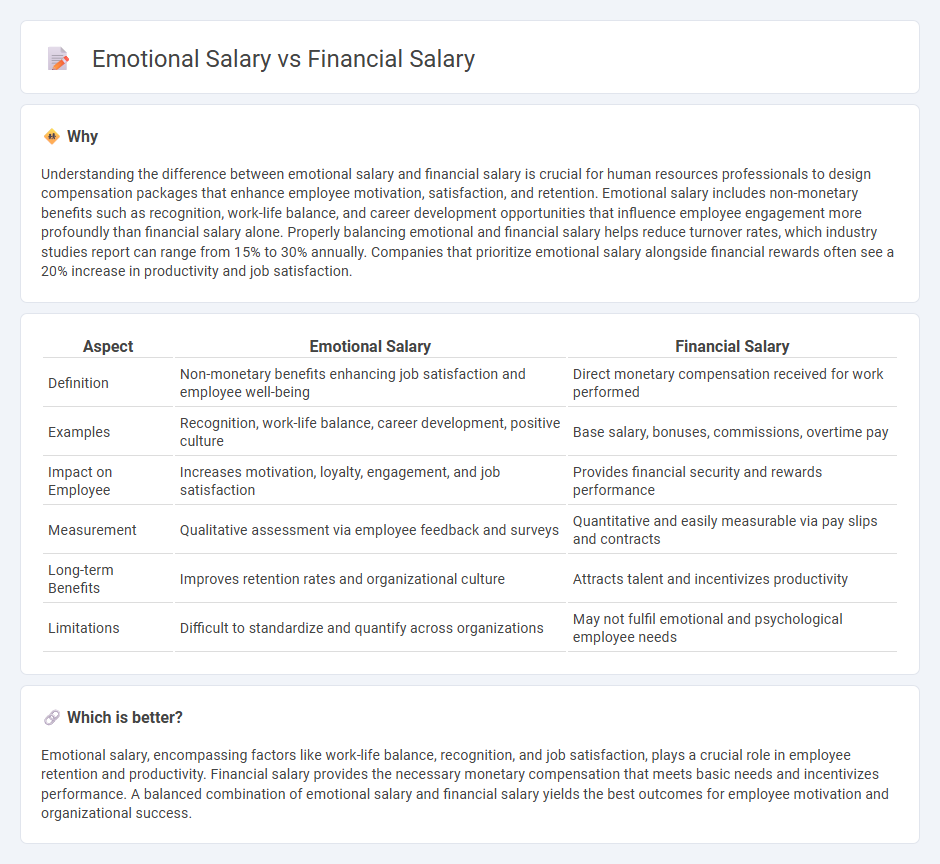
Emotional salary encompasses non-monetary benefits such as job satisfaction, work-life balance, and meaningful recognition that contribute to employee motivation and retention. Financial salary refers to the tangible monetary compensation including base pay, bonuses, and incentives that directly impact an employee's financial well-being. Discover how balancing emotional and financial salary enhances workforce engagement and productivity.
Why it is important
Understanding the difference between emotional salary and financial salary is crucial for human resources professionals to design compensation packages that enhance employee motivation, satisfaction, and retention. Emotional salary includes non-monetary benefits such as recognition, work-life balance, and career development opportunities that influence employee engagement more profoundly than financial salary alone. Properly balancing emotional and financial salary helps reduce turnover rates, which industry studies report can range from 15% to 30% annually. Companies that prioritize emotional salary alongside financial rewards often see a 20% increase in productivity and job satisfaction.
Comparison Table
| Aspect | Emotional Salary | Financial Salary |
|---|---|---|
| Definition | Non-monetary benefits enhancing job satisfaction and employee well-being | Direct monetary compensation received for work performed |
| Examples | Recognition, work-life balance, career development, positive culture | Base salary, bonuses, commissions, overtime pay |
| Impact on Employee | Increases motivation, loyalty, engagement, and job satisfaction | Provides financial security and rewards performance |
| Measurement | Qualitative assessment via employee feedback and surveys | Quantitative and easily measurable via pay slips and contracts |
| Long-term Benefits | Improves retention rates and organizational culture | Attracts talent and incentivizes productivity |
| Limitations | Difficult to standardize and quantify across organizations | May not fulfil emotional and psychological employee needs |
Which is better?
Emotional salary, encompassing factors like work-life balance, recognition, and job satisfaction, plays a crucial role in employee retention and productivity. Financial salary provides the necessary monetary compensation that meets basic needs and incentivizes performance. A balanced combination of emotional salary and financial salary yields the best outcomes for employee motivation and organizational success.
Connection
Emotional salary and financial salary are interconnected components of employee compensation that together influence job satisfaction and retention. Emotional salary includes non-monetary benefits such as recognition, work-life balance, and career development opportunities, which enhance motivation and loyalty. Financial salary provides tangible monetary rewards, and when combined with emotional salary, it creates a holistic approach to employee well-being and productivity.
Key Terms
Compensation
Financial salary provides tangible compensation in the form of monetary payments, bonuses, and benefits that reward employees for their work. Emotional salary encompasses non-monetary rewards such as recognition, work-life balance, job satisfaction, and career growth opportunities, which contribute to employee motivation and loyalty. Explore how combining financial and emotional compensation strategies can enhance overall employee engagement and retention.
Recognition
Recognition plays a critical role in both financial and emotional salary by motivating employees and enhancing job satisfaction. While financial salary provides tangible rewards, emotional salary through recognition fosters a sense of value and belonging, boosting overall morale and productivity. Explore how integrating recognition into your compensation strategy can elevate employee engagement and retention.
Work-Life Balance
Financial salary refers to the monetary compensation received from employment, including base pay, bonuses, and benefits, which directly impacts an individual's economic stability. Emotional salary encompasses non-monetary rewards such as job satisfaction, recognition, personal growth, and work-life balance, contributing to overall well-being and motivation. Explore how balancing financial and emotional salaries can enhance your career happiness and productivity.
Source and External Links
What Do Finance Jobs Pay? (Roles & 2025 Salary Data) - This article provides insights into the wide range of salaries in finance jobs, including median earnings for various roles such as accountants, financial managers, and personal financial advisors.
Finance Degree Salary in North Carolina - It reports the average annual salary for individuals with a finance degree in North Carolina is about $84,184, with salaries varying based on experience and position.
2025 Financial Analyst Salary in Raleigh-Durham, NC - The average salary for a financial analyst in Raleigh-Durham, NC is $90,750, with a range from $38,000 to $725,000 depending on experience and specific job roles.
 dowidth.com
dowidth.com